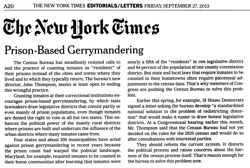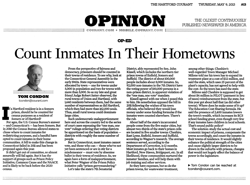Boston Globe explores prison gerrymandering in Mass.
Boston Globe covers prison gerrymandering in Mass. towns, highlights pending resolution urging Census Bureau to act.
by Aleks Kajstura, March 20, 2014
The Boston Globe published an article by Johanna Seltz today taking a thorough look at how prison gerrymandering undermines democracy in Massachusetts:
It’s been called the purest form of democracy — the annual Massachusetts ritual of town meeting dating back to the 1630s — when neighbors get together to spend their community’s money and set its rules, arguing everything from whether to build a new school to how much to charge for trash disposal.
But as this spring’s town meeting season rolls in, a research group is questioning whether the institution is working as it should in communities that host prisons, including Billerica, Dedham, Framingham, Plymouth, and Walpole.
The Prison Policy Initiative in Easthampton says that voters in some precincts in those towns wield unfair power — with more town meeting members than they should have.
That’s because the US Census Bureau counts incarcerated people as residents of their prison locations, rather than their home addresses, according to report author Aleks Kajstura. The method is used, she said, even though prisoners can’t vote in local elections.
…
…Walpole Town Clerk Ron Fucile said he’s been concerned for a while about the fairness of including the prisoners at the state MCI-Cedar Junction as part of the town’s precinct five. Earlier this month he successfully asked selectmen to reduce the number of Town Meeting seats in that precinct by one — adding it to another precinct.
“It’s more the way it ought to be,” Fucile said. He said he’d ultimately like the town charter changed to scrub the prison population altogether from the formula used to determine precinct seats. The number of prisoners fluctuates, but is usually about 700, he said.
“I also told the board it is time the Census Bureau and our Legislature come up with a law which addresses the prison being there,” he added.
In fact, pending legislation on Beacon Hill would “urge” the Census Bureau to use prisoners’ home addresses for redistricting purposes.
The bill, sponsored by Senators Sonia Chang-Diaz and Linda Dorcena Forry of Boston and Representative Thomas Stanley of Waltham, says that the current method “results in distortions of the one-person, one-vote principle in drawing electoral districts in Massachusetts, diluting the representation of the majority of districts that do not contain prisons.”
…
Study says prison population pads voter tally in some districts, by Johanna Seltz, Boston Globe
For more info, check out our Massachusetts page on ending prison gerrymandering in Massachusetts.






